Notes by Yandi
My name is Ayanda (also known as Yandi), and I am dean's merit list, final year student currently pursuing a major in political studies at UCT. Every year, I make summarised, yet detailed notes on both the lectures and readings for a given course to help my class mates understand complicated content; as well as succeed in their assignments, tutorials and exams.
- 11
- 0
- 1
Community
- Followers
- Following
1 Reviews received
12 items
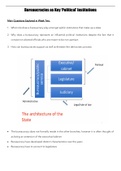
All lecture Notes for UCT's Comparative Public Institutions Course
This Bundle contains Summarised, yet Detailed Lectures Notes for UCT's Second Year 'Comparative Public Institutions' Course: POL2042S
- Package deal
- • 10 items •
- Lecture Notes the Relationship between Bureaucrats and Politicians • Class notes
- Lecture Notes on the New Public Management Model • Class notes
- Lecture Notes on the Governance Approach • Class notes
- Lecture Notes on the Behaviour of Rational Institutions • Class notes
- Lecture Notes on the Rational Bureaucratic Model • Class notes
- And more ….
This Bundle contains Summarised, yet Detailed Lectures Notes for UCT's Second Year 'Comparative Public Institutions' Course: POL2042S

Lecture Notes on Bureaucracies and Economic Development
Summarised, yet detailed lectures notes on how the success or failure of bureaucratic work can affect economic development.
- Class notes
- • 9 pages •
Summarised, yet detailed lectures notes on how the success or failure of bureaucratic work can affect economic development.

Lecture Notes on Bureaucracies as Key Political Institutions
This document includes information on: * The Role of Bureaucracies * Why Bureaucracies Represent an Influential Political Institutions Despite the Fact that it Consist Non-Elected Officials who are Meant to be Non-Partisan
- Package deal
- Class notes
- • 2 pages •
This document includes information on: * The Role of Bureaucracies * Why Bureaucracies Represent an Influential Political Institutions Despite the Fact that it Consist Non-Elected Officials who are Meant to be Non-Partisan
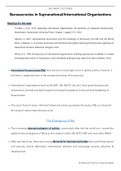
Lecture Notes on Bureaucracies in International Organisations
Summarised, yet detailed lecture notes on bureaucracies in International Organisations in the UN. We take a look at how the bureaucratic affairs and issues manifest on a global scale when the trajectories of global politics, contrasting political ideologies and varied socio-cultural contexts come into play within international bureaucracies.
- Package deal
- Class notes
- • 6 pages •
Summarised, yet detailed lecture notes on bureaucracies in International Organisations in the UN. We take a look at how the bureaucratic affairs and issues manifest on a global scale when the trajectories of global politics, contrasting political ideologies and varied socio-cultural contexts come into play within international bureaucracies.
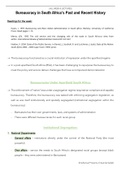
Lecture Notes on Bureaucracies in South Africa
Summarised, yet detailed lectures notes on how bureaucracies function in a South African context - and more specifically, how bureaucracies operated under the oppressive apartheid regime.
- Package deal
- Class notes
- • 8 pages •
Summarised, yet detailed lectures notes on how bureaucracies function in a South African context - and more specifically, how bureaucracies operated under the oppressive apartheid regime.
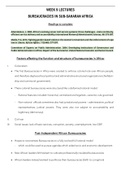
Lecture Notes on Bureaucracies in Sub-Saharan Africa
Summarised, yet detailed notes on the functionality of rational bureaucracies in a sub-saharan context.
- Package deal
- Class notes
- • 5 pages •
Summarised, yet detailed notes on the functionality of rational bureaucracies in a sub-saharan context.
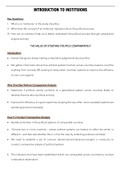
Lecture Notes on the Introduction to Institutions
Summarised, yet detailed lectures notes on: * the value of comparative analysis * how to conduct comparative analysis * Why institutions matter in the study of politics * How we use institutions to study politics comparatively [NB! contains 2 spelling mistakes of the word 'institutions']
- Package deal
- Class notes
- • 2 pages •
Summarised, yet detailed lectures notes on: * the value of comparative analysis * how to conduct comparative analysis * Why institutions matter in the study of politics * How we use institutions to study politics comparatively [NB! contains 2 spelling mistakes of the word 'institutions']
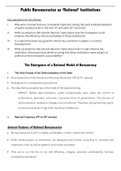
Lecture Notes on the Rational Bureaucratic Model
Summarised, yet detailed notes on the Rational Bureaucratic Model. The notes includes include information on: * the emergence of the model * what the model is * the general features of the model * the conceptualisation of the rational model into the 'Weberian Framework' by Max Weber
- Package deal
- Class notes
- • 2 pages •
Summarised, yet detailed notes on the Rational Bureaucratic Model. The notes includes include information on: * the emergence of the model * what the model is * the general features of the model * the conceptualisation of the rational model into the 'Weberian Framework' by Max Weber
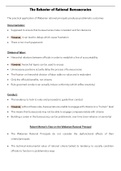
Lecture Notes on the Behaviour of Rational Institutions
Summarised, yet Detailed Lectures Notes about the behaviour of public bureaucracies who adopt the Rational Model/Weberian Framework. These notes include these characteristics of a Rational Bureaucracy, as well as some of the shortcomings of the model identified by Michael Lipsky,
- Package deal
- Class notes
- • 3 pages •
Summarised, yet Detailed Lectures Notes about the behaviour of public bureaucracies who adopt the Rational Model/Weberian Framework. These notes include these characteristics of a Rational Bureaucracy, as well as some of the shortcomings of the model identified by Michael Lipsky,
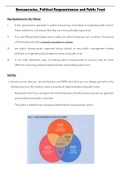
Lecture Notes on the Governance Approach
Summarised, yet detailed lectures notes on the Governance Approach: a theoretical approach to how public bureaucracies can operative more efficiently, effectively and with greater public responsiveness and trust.
- Package deal
- Class notes
- • 3 pages •
Summarised, yet detailed lectures notes on the Governance Approach: a theoretical approach to how public bureaucracies can operative more efficiently, effectively and with greater public responsiveness and trust.

Lecture Notes on Bureaucracies in South Africa